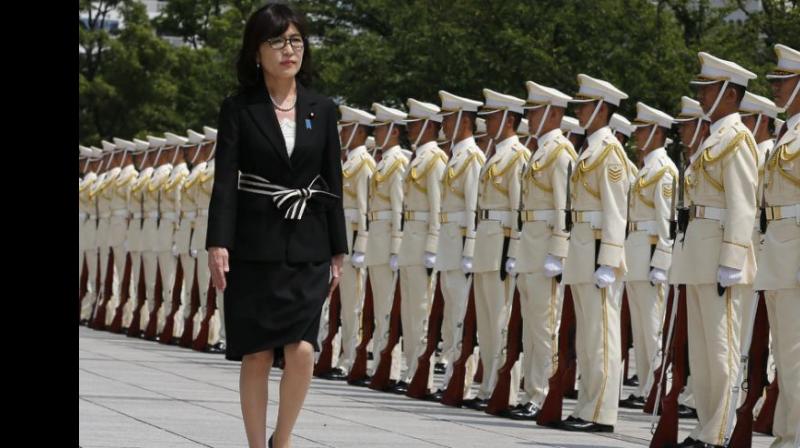Japan's defence minister visits Yasukuni shrine after Pearl Harbor

Tokyo: Defence Minister Tomomi Inada, just back from a visit to Pearl Harbor, has visited a Tokyo shrine that honours Japan's war dead, including convicted war criminals.
The visit on Thursday, and one by another Cabinet minister the day before, drew rebukes from neighbouring South Korea and China.
Earlier this week, Inada accompanied Prime Minister Shinzo Abe during his visit to Hawaii's Pearl Harbor, where he offered condolences to those who died in the Japanese attack there in 1941.
Japan's Asian neighbours harbor bitter memories of the country's atrocities before and during World War II, when it colonised or invaded much of the region. So visits by top Japanese leaders to the shrine often draw complaints from countries such as China and South Korea that see them as attempts to whitewash that history of wartime aggression.
Since drawing complaints when he visited Yasukuni in December 2013, Abe has instead sent gifts of money and religious ornaments.
Japan's Kyodo News service reported that Abe, who was golfing outside Tokyo, refused comment when asked about Inada's visit.
The defense minister doffed her shoes on her way into the shrine, and afterward told waiting journalists, "Regardless of differences in historical views, regardless of whether they fought as enemies or allies, I believe any country can understand that we wish to express gratitude, respect and gratitude to those who sacrificed their lives for their countries."
China's CCTV news and its official Xinhua News Agency remarked on the timing of the visit, just after Inada's return from Hawaii.
South Korea's Foreign Ministry said it was "deplorable" that Inada had visited a shrine that "beautifies past colonial invasions and invasive war and honors war criminals."
The ministry also called in Kohei Maruyama, a minister at the Japanese Embassy in South Korea, to lodge protest over the Yasukuni visit, to protest over the Yasukuni visit.
The country's Defense Ministry expressed "serious concern and regret."
Inada's visit was her first since becoming defence minister last summer, though she has regularly visited it in the past. A lawyer-turned-lawmaker with little experience in defense, she is one of Abe's proteges and backer of his long-cherished hope to revise Japan's Constitution. She has said parts of the war-renouncing Article 9 should be scrapped, arguing that they could be interpreted as banning Japan's military.
Inada has defended Japan's wartime atrocities, including forcing many Asian women into sexual servitude in military-run brothels, and has led a party committee to re-evaluate the judgment of war tribunals led by the victorious Allies.
Her link to a notorious anti-Korea group was acknowledged by a court this year in a defamation case she lost. Inada also was seen posing with the leader of a neo-Nazi group in a 2011 photo that surfaced in the media in 2014.
Masahiro Imamura, Japan's disaster reconstruction minister, went to Yasukuni on Wednesday, drawing criticism from Beijing.
A Chinese Foreign Ministry spokesperson, Hua Chunying, said his visit "reflects the Japanese government's unhealthy attitude toward its past transgressions."

